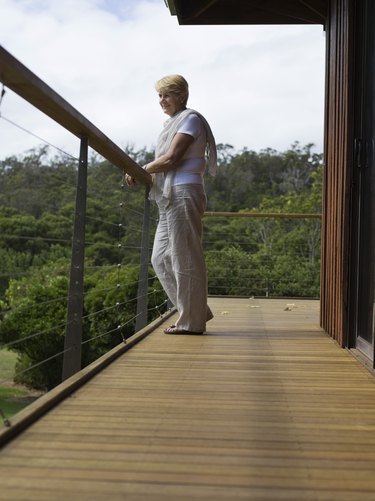
Interior balcony rails require a permit, similar to most structures built within a home or commercial building. Codes vary among cities as well as among residential and commercial applications for a rail installation. While adhering to building codes is crucial to having the structure approved by the city building department, you may need to institute other construction guidelines to ensure the rails are safe for all.
Permit Requirements
Video of the Day
A permit is generally required with adding a balcony and rail system to the interior of a home or commercial building. Most cities require you to fill out a building permit application. Along with the application, you may be required to submit copies of the construction plans.
Video of the Day
Building Codes
Because an interior balcony sits off the floor, it must adhere to a maximum distance between the railing's spindles or balusters. A 4-inch diameter ball should not be able to pass between them. The height of the railing is also specified by city building code. Residential properties typically require a railing of 36 inches, while commercial properties should have railings between 42 and 48 inches. Railings must withstand at least 200 pounds of pressure in either direction. Railing systems require regular inspection to ensure they are secure.
Children
Those with children must consider balcony rail guidelines pertinent to a child's safety. Rail spindles or balusters must not have enough space between them that a child could fit or get stuck between the rails. The rails should sit high enough so a child can not fall over them. Securing thick plexiglass sheets between the rails provides a greater degree of protection so a child cannot access the space between the rails.
Warnings and Tips
Some cities provide a checklist to check the safety of a balcony railing. Use this checklist when constructing the railing, as well as for periodic safety inspections. After constructing a balcony rail system, have it inspected by both a structural engineer and the city building department to ensure it's structurally sound and safe.